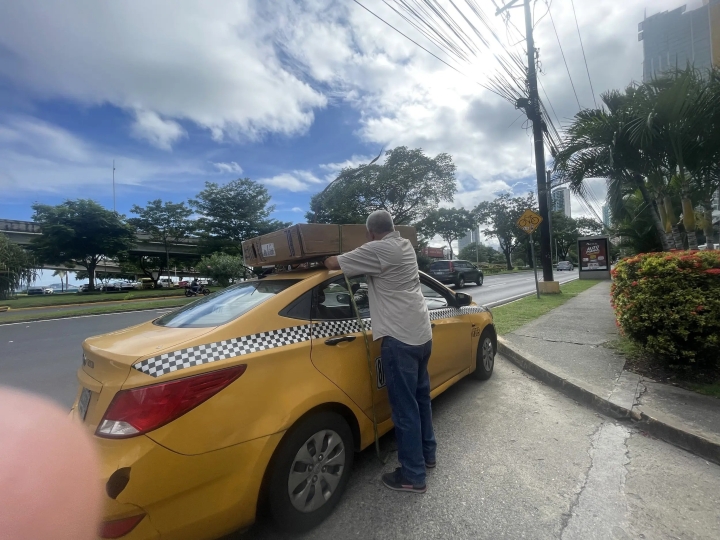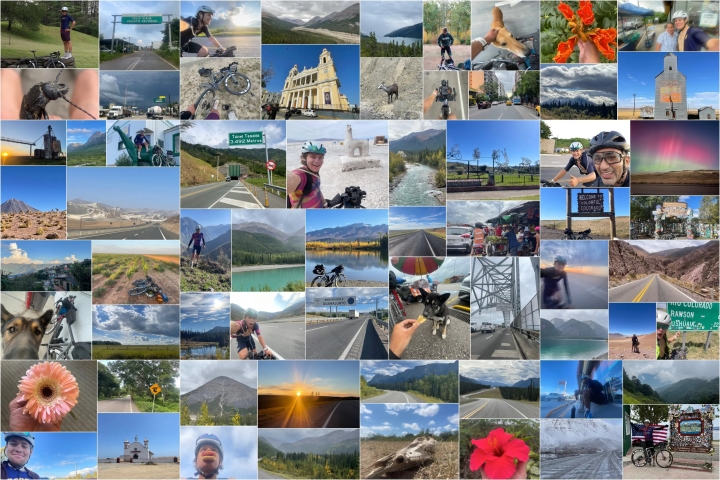On Aug. 31, Bond Almand ’26 set out from Prudhoe Bay, Alaska, to bike the Pan American route that runs roughly 14,000 miles from Alaska to Argentina.
On Nov. 15, after a grueling 75-day ride through snow, ice, mud, headwinds, drenching rain, and suffocating heat, Almand reached Ushuaia, the capital of Tierra del Fuego province, and the southernmost city in the world.
In the process, Almand set a world speed record for bikepacking. He bested the previous record on the Pan American route by a little less than nine days, according to Velo; a feat that required him to gain 600,000 feet in elevation and sent him through ice fields, mountains, prairies, rainforest and desert, and along dangerously chaotic highways, with much of the trip cataloged on his blog.
And Almand did it alone, without the help of a ride-along support crew. (He funded the trip using his own money and with help from Dartmouth alumni. His bike and camping equipment were donated by outdoor gear companies.)

Almand, who is studying climate science, sustainable energy, and government, grew up in Tennessee, close to Great Smoky Mountains National Park, where he spent much of his childhood “traipsing around and running on the extensive network of trails, including the Appalachian Trail,” he wrote in an email from Puntas Arenas, Chile.
Given his affinity for spending as much time as possible outside, applying to and choosing Dartmouth, with its proximity to nature, seemed inevitable, Almand says. Although he is an ultra-runner and had done a number of endurance rides, the Pan American route was a different order of magnitude. It “encompasses the harshest climates, some of the most dangerous regions of the world, and an incredibly difficult route,” Almand wrote.
He was worried about bike problems or road accidents (which happened), being robbed (which did not), suffering physical injuries (he endured) and bouts of food poisoning (exhausting). But he was more concerned about his mental fitness and psychological fortitude. In a blog entry as he approached Lima, Peru, Almand wrote that he had been “falling apart the past week and catastrophe could strike at any second.”
Such moments were balanced by an experience he had on Day 62 when he “rode across the crest of the Andes into Argentina. The pass, Paso Jama, took me up to 15,853 ft. Today was one of the most remarkable and stunning rides of my life.”
Almand undertook the daunting ride not only to test himself but also to raise funds for the environmental causes he espouses.
Working with the Honnold Foundation, founded by rock climber Alex Honnold, Almand is raising money that will support the installation of solar panels in Indigenous Amazonian communities in Ecuador and Brazil.

Almand’s passion for cycling and his passion for nature and the environment, he wrote, “would both exist independently, but they were fostered together and now exist together. I think it’s nearly impossible to spend so much time outside and not feel an attachment and sense of urgency for the protection for our natural world.”
“He’s not scared of things that would make an average person pale. He’s not scared of physical discomfort; he’s prepared to endure it in pursuit of a goal. But he is also driven by his moral compass. Climate change really motivates him,” says Sustainability Director Rosi Kerr ’97, who has worked with Almand as a Dartmouth Bikes intern.
Now that Almand has reached his goal, there will be no biking in the immediate future–at least for a few days. “I will be flying home although I contemplated swimming back to Hanover,” he jokes.


